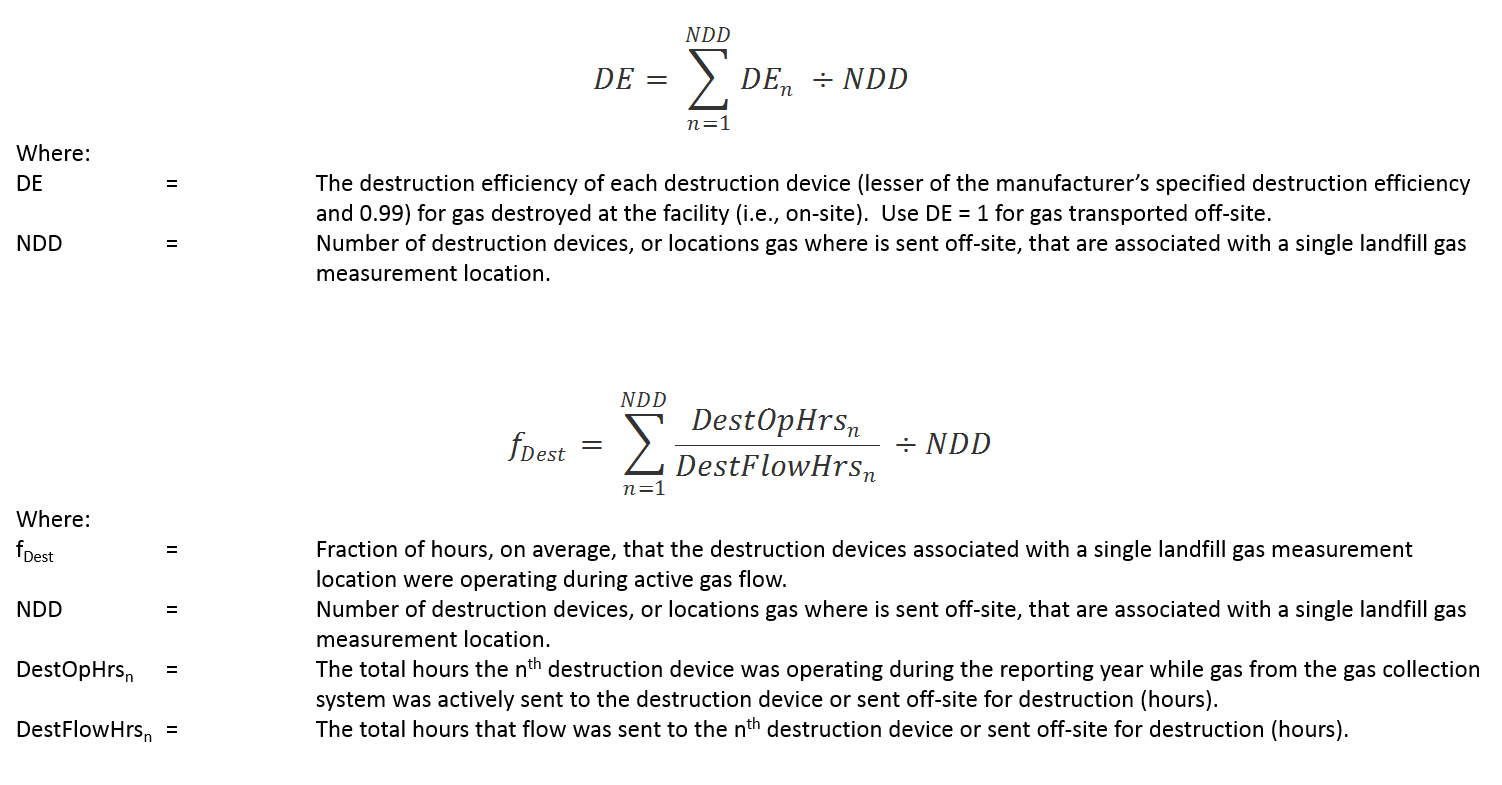Q389. Within e-GGRT, how would a landfill handle multiple destruction devices including a portion of the gas sent off-site for destruction? Is there a way to add multiple on-site destruction devices for a gas system?
A389. Beginning in Reporting Year (RY) 2013 and following years, data elements related to on-site destruction and/or backup destruction devices are no longer required to be reported. Instead, destruction device information is reported by measurement location and destruction device. For facilities with gas collection and control systems, more than one measurement location may be reported. Additionally, more than one destruction device associated with one or more measurement locations may be reported. This technical correction was made to improve calculation and verification of the terms fDest and fRec used in Equations HH-7 and HH-8.
The following is provided to assist in performing the calculations and reporting of certain elements when several destruction devices are used routinely. Two basic scenarios are considered: 1) flow and methane content are measured at a single central location and the gas is then piped to different destruction devices (either all on-site or a combination of on-site and off-site), but the flow rate per device is not measured; 2) flow and methane content are measured separately for each on-site destruction device and, if applicable, gas is sent off-site for destruction. Further information can be found via the e-GGRT Help link in the left-hand margin of e-GGRT. Go to Using Subpart HH Calculation Spreadsheets andthen to Using the Equation HH-6, HH-7, and HH-8 Calculation Spreadsheet. See the worksheet titled “MultiDD_per_MeasLocation” for assistance with Scenario 1 below, and the worksheet titled “Equation HH-6, HH-7, HH-8_Multi” for assistance with Scenario 2 below.
Scenario 1, Central measurement location and multiple destruction devices.
Determine a single value of R directly from measurement data using Equation HH-4.
Determine a single value for DE using the average destruction efficiency of all destruction devices, see equation below.
Determine fDest,n for each measurement location as the total annual hours for which each destruction device was operated divided by the total annual hours that flow was sent to the destruction device. Take the average of all fDest,n values to determine fDest. See equation below.
Determine a single value for CE using Table HH-3 considering the entire facility.
Determine a single value of fRec based on the annual operating hours of the gas collection system.
Equations HH-6 through HH-8 can be used directly given the parameters determined above. Other e-GGRT reporting parameters (annual volume of gas, annual average methane concentration, and number of days/month missing data procedures were used) are straightforward under this scenario.
Scenario 2, Measurement at different locations.
- Determine a value of R using Equation HH-4 for each measurement location.
- Determine a value of DE for each destruction device.
- Determine a value of fDest for each destruction device based on the total hours in the reporting year for which the specific destruction device operated divided by the total hours flow was sent to the destruction device (or the annual hours the collection system operated for gas transported off-site for destruction)
- Determine a single value for CE using Table HH-3 considering the entire landfill facility. If separate gas collection systems are operated for different destruction devices, determine a value of fRec for each destruction device-specific gas collection system; otherwise, determine a single value of fRec based on the annual operating hours of the collection system for each measurement location.
Equations HH-6 through HH-8 can be used directly given the summed parameters determined above. When reporting other data elements associated with multiple measurement locations, we recommend the following steps:
Report the annual volume of landfill gas collected as the cumulative volume of gas collected across all measurement locations.
Report the annual average CH4 concentration as the direct arithmetic average of the measured concentrations across all measurement locations (do not use a flow weighted average concentration).
Report the missing data times as the cumulative number of instances that missing data procedures were used across all measurement locations. [Note that the system allows you to report missing concentration data on a daily or monthly basis.]
| Wiki Markup |
|---|
{show-to:group=confluence-Users}{_}Footer / References Bar which is Visible to the public{_}{show-to} |
| Panel | ||||||||
|---|---|---|---|---|---|---|---|---|
Updated on
|
| Wiki Markup |
|---|
{show-to:group=confluence-Users}
{info}
Source: This question and answer was derived from a Legacy FAQ, revised by R. Schmeltz, 2/11/2013 and 2/6/2014.
Approval / Publishing History: Version 3, approved by L. Grogan-McCulloch, 2/??/2014
Expiration: none
Relevant Subparts: Subpart HH
{info}{_}History Panel For Internal Use - Not Visible to the Public{_}{show-to} |

